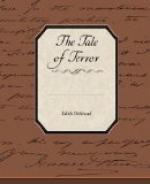“Most horrid was it—for,
behold, the floor
Has stain of blood—and will
be clean no more.
Hark to the winds! which through the wide
saloon
And the long passage send a dismal tune,
Music that ghosts delight in—and
now heed
Yon beauteous nymph, who must unmask the
deed.
See! with majestic sweep she swims alone
Through rooms, all dreary, guided by a
groan,
Though windows rattle and though tap’stries
shake
And the feet falter every step they take.
Mid groans and gibing sprites she silent
goes
To find a something which will soon expose
The villainies and wiles of her determined
foes,
And having thus adventured, thus endured,
Fame, wealth, and lover, are for life
secured."[109]
Crabbe’s Ellen Orford in The Borough (1810) is drawn from life, and in grim and bitter irony is intended as a contrast to these timorous and triumphant creatures
“borrowed
and again conveyed,
From book to book, the shadows of a shade.”
Ellen’s adventures are sordid and gloomy, without a hint of the picturesque, her distresses horrible actualities, not the “air-drawn” fancies that torture the sensitive Angelinas of Gothic fiction:
“But not like them has she been
laid
In ruined castle sore dismayed,
Where naughty man and ghostly sprite
Fill’d her pure mind with awe and
dread,
Stalked round the room, put out the light
And shook the curtains round the bed.
No cruel uncle kept her land,
No tyrant father forced her hand;
She had no vixen virgin aunt
Without whose aid she could not eat
And yet who poisoned all her meat
With gibe and sneer and taunt.”
Though Crabbe showed scant sympathy with the delicate sensibilities of girls who hung enraptured over the high-pitched heroics and miraculous escapes of Clementina and her kindred, he found pleasure in a robuster school of romance—the adventures of mighty Hickathrift, Jack the Giant-killer, and Robin Hood, as set forth and embellished in the chapbooks which cottagers treasured “on the deal shelf beside the cuckoo-clock."[110] And in his poem, Sir Eustace Grey, he presents with subtle art a mind tormented by terror.
CHAPTER VIII — SCOTT AND THE NOVEL OF TERROR.
In 1775 we find Miss Lydia Languish’s maid ransacking the circulating libraries of Bath, and concealing under her cloak novels of sensibility and of fashionable scandal. Some twenty years later, in the self-same city, Catherine Morland is “lost from all worldly concerns of dressing or dinner over the pages of Udolpho,” and Isabella Thorpe is collecting in her pocket-book the “horrid” titles of romances from the German. In 1814, apparently, the vogue of the sentimental, the scandalous, the mysterious, and the horrid still persisted. Scott, in the introductory chapter to Waverley, disrespectfully passes in review the modish novels, which, as it proved, were doomed to be supplanted by the series of romances he was then beginning:




